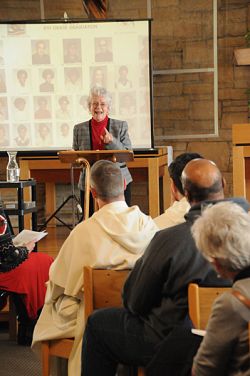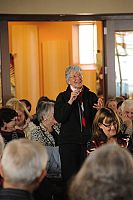Sr. Florence Deacon: Vatican II and Pope Francis describe 'a new way of being Church'

SALT LAKE CITY — In 1906, Pope Pius X described the Catholic laity as "a docile flock" whose one duty was to follow the pastors. In the 1960s, that image was demolished by the documents of Vatican II, which called the laity to share in the priestly, prophetic and kingly functions of Christ. Now Pope Francis is echoing several of his predecessors by calling for a greater involvement of women in the Church.
In fact, Pope Francis represents a "paradigm shift," said Franciscan Sister Florence Deacon, who opened the 2014 Aquinas Lecture at Saint Catherine of Siena/Newman Center on Jan. 26 with the quote from Pope Pius X. She continued by outlining some of the ways the view of the laity has changed in the past century.
Sr. Florence is the director of the Sisters of St. Francis of Assisi in St. Francis, Wisc., and also a member of the presidency of the Leadership Conference of Religious Women, which represents most of the women religious in the United States.
Pope Francis "showed us a new way of being Bishop of Rome" and has gone back to the Vatican II documents, "which also show us a new way of being Church," said Sr. Florence.
She was a novice when Vatican II concluded, and "we eagerly studied each document as it was translated into English and applied it to our lives," she told the crowd of about 300 people.
While the Vatican II documents call on all Catholics to be more involved in the world, "to be women and men of the Church and of the Gospel, for consecrated religious it becomes our central focus," Sr. Florence said. "Fifty years later, we’re still trying to figure out how to weave together those roles as we apply the Gospel in our day."
Among the difficulties faced by American women religious has been the Vatican’s doctrinal assessment of the Leadership Conference of Religious Women in 2012, and subsequent mandate.
Sr. Florence declined to discuss the doctrinal assessment "because it’s very delicate and we’re listening to each other and coming at a common understanding," she said.
Nevertheless, "It has become increasingly clear that the doctrinal assessment and the subsequent mandate, which the CDF issued, was not just about us, but it reflected larger questions of the Church, such as the ongoing implementation of the Second Vatican Council, the ecclesial roles of women and men; the ecclesial roles of women religious and the laity, especially women; understandings of authority; faithful dissent and obedience; and the need for spaces where honest, probing questions about faith and belief can be raised and discussed," she said.
It was exactly these changing roles of women and men, of women religious and the clergy that were the focus of Sr. Florence’s talk, which she peppered heavily with quotes from the Vatican II documents and from various popes and particularly Pope Francis’ recent apostolic exhortation, The Joy of the Gospel.
For example, as women religious and the laity have encouraged the Church to integrate relevant findings from the new advances in psychology, anthropology and other sciences into appropriate areas of Church teaching, "this has caused a little grief," Sr. Florence said, to laughter from the crowd.
However, in Joy of the Gospel, "Pope Francis stressed the importance of theology being a dialog with the other sciences and human experiences in discerning how to bring the Gospel to other cultures," she added. The document also acknowledges that women already are sharing pastoral responsibilities with priests and contributing to theological reflection, she pointed out.
"In reality, Pope Francis is calling for a lot of that integration of new understandings of Church teaching that a lot of us ... have been hoping would happen," Sr. Florence said.
Holy Cross Sister Suzanne Brennan, president and executive director of Holy Cross Ministries in Salt Lake City, said two aspects of Sr. Florence’s talk that struck her were the emphasis on service in the Church for everyone, and the need to integrate political, social, economic and religious views, "which will bring, I think, a transformation into the world."
Another of those who attended was the Rev. Canon Caryl Marsh of the Episcopal Cathedral of Saint Mark in Salt Lake City, who said she was attracted by Sr. Florence’s title, "Women of the Gospel, Women of the Church." Canon Marsh offers workshops on women in religion, and said the Aquinas lecture deepened her understanding of Vatican II, but she particularly liked the quote from Pope Pius X.
The annual Aquinas Lecture honors one of the Church’s great theologians and carries on his mission of coming to know and love God more deeply, said Dominican Father Carl Schlichte, pastor of St. Catherine of Siena/Newman Center, adding that he was pleased to see many people from the larger community at the event.
"That is exactly what events like this are supposed to do: highlight what we as a Church are looking for, wanting to be, and that it includes everybody," Fr. Carl said. "In the best Dominican tradition, we don’t argue to win, we argue to find truth, and no one person has all the truth, so we have to bump up against one another and discover it in our loving, caring interaction with one another."
© Copyright 2024 The Diocese of Salt Lake City. All rights reserved.


Stay Connected With Us